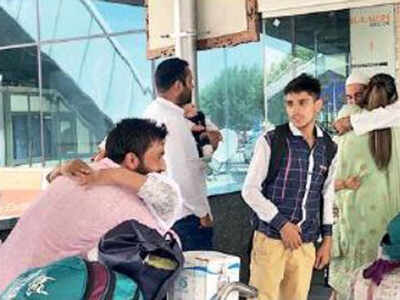- News
- India News
- Last batch that left Kashmir in July for Haj returns to a different state of reality
Trending
This story is from September 13, 2019
Last batch that left Kashmir in July for Haj returns to a different state of reality

Relatives welcome pilgrims returning from Haj in Srinagar on Friday
The last batch of Haj pilgrims who had left Kashmir late July returned to their homes in the Valley, which remains partially shut even on the 38th day since August 5, when the state’s special status was revoked.

“We left from Kashmir on July 29. We got to know about the revocation of Article 370 while we were on the Haj. It was shocking and disturbing. We were very anxious about our families and relatives. We prayed for Kashmir’s peace,” a woman who did not want to be named told TOI.
Another pilgrim, Dr Nisar Hussain Qadri, said the pilgrimage to Mecca in Saudi Arabia was hassle-free and highly satisfactory. “Didn’t face any inconvenience to and fro,” he said. Other pilgrims standing next to him said they were able to communicate with their families on the landline after 27 days.
However, most said that despite the mobile and internet shutdown, the annual Haj pilgrimage, which began on July 4 and ended on Friday, had been smooth. Over 10,800 people from Kashmir went to Mecca this year, Srinagar DC Shahid Iqbal Choudhary said, adding that the state provided the pilgrims transport from the airport.
Interestingly, Saudi Arabia has issued no statement on New Delhi’s revocation of Jammu and Kashmir’s special status in the Indian Constitution. The Organisation of Islamic Cooperation, (OIC), which in the past used to show sympathy towards Pakistan’s position on Kashmir, has also stayed quiet on the issue this time. In fact, amid the shutdown in Kashmir, the UAE gave Modi its highest civilian award, recognising his efforts to strengthen bilateral relations between the two countries. Saudi Arabia had already honoured Modi by giving him its highest civilian award in 2016.
A deputy superintendent who was not authorised to speak to media told TOI, “People in Kashmir don’t believe anything that Indian nationalistic news channels report. If Indian media shows that Pakistan is weak and the Muslim countries don’t support Pakistan on Kashmir, people here believe just the opposite. And even if they know there is no international support for Kashmir’s freedom from India or Kashmir’s accession with Pakistan, they will protest without any backing. The fact is the lockdown in Kashmir has prevailed due to anger against the revocation of the special status of J&K in the Indian Constitution.”
However, a cab driver in Srinagar, Omer, said the lockdown in Kashmir was only an “optical illusion”. “Except for educational institutions and a handful of main markets, everything is running quietly even if sluggishly. There are night markets selling everything. Some markets open at 6 am.”
Bashir, a hotel staffer, said, “The only people affected by this daytime lockdown voluntarily imposed by people due to the threat of terrorists and separatists, are the poor people. That’s why you will see hawkers even during the day. We don’t know how long this stalemate will continue but it has gotten on our nerves. I haven’t been to my home for a month and there is no way to communicate with the family either.”
Many police officers in Srinagar argue that the lack of mobile phones and internet has caused massive loss to the economy and immense discomfort and anxiety to the people. “I think it is high time to restore mobile phone connectivity,” a senior Kashmiri police officer said.
End of Article
FOLLOW US ON SOCIAL MEDIA









